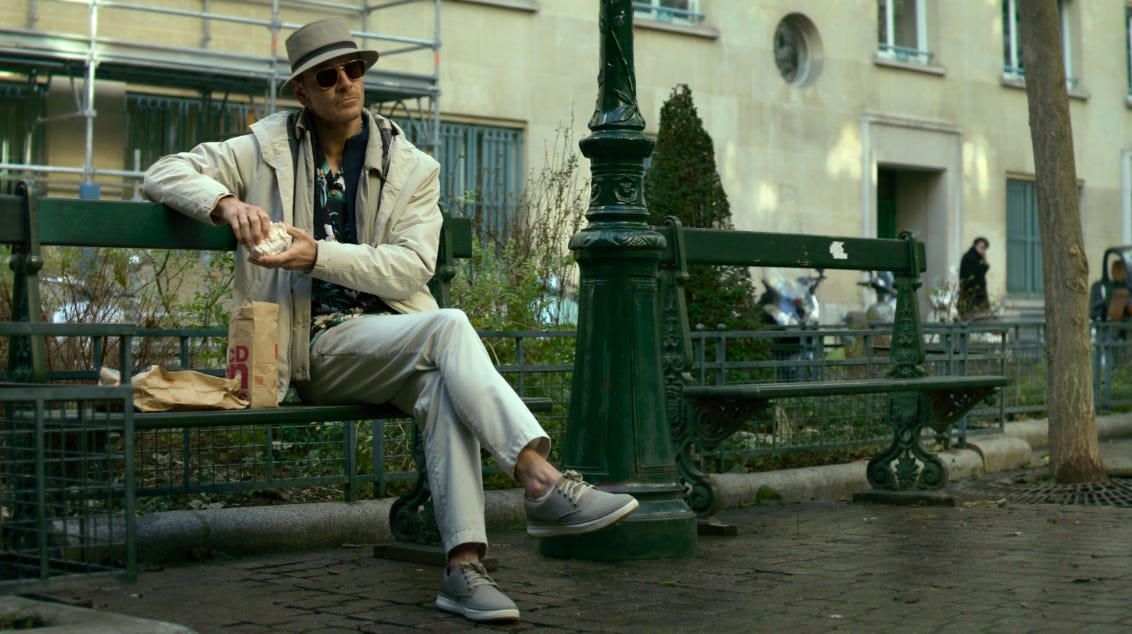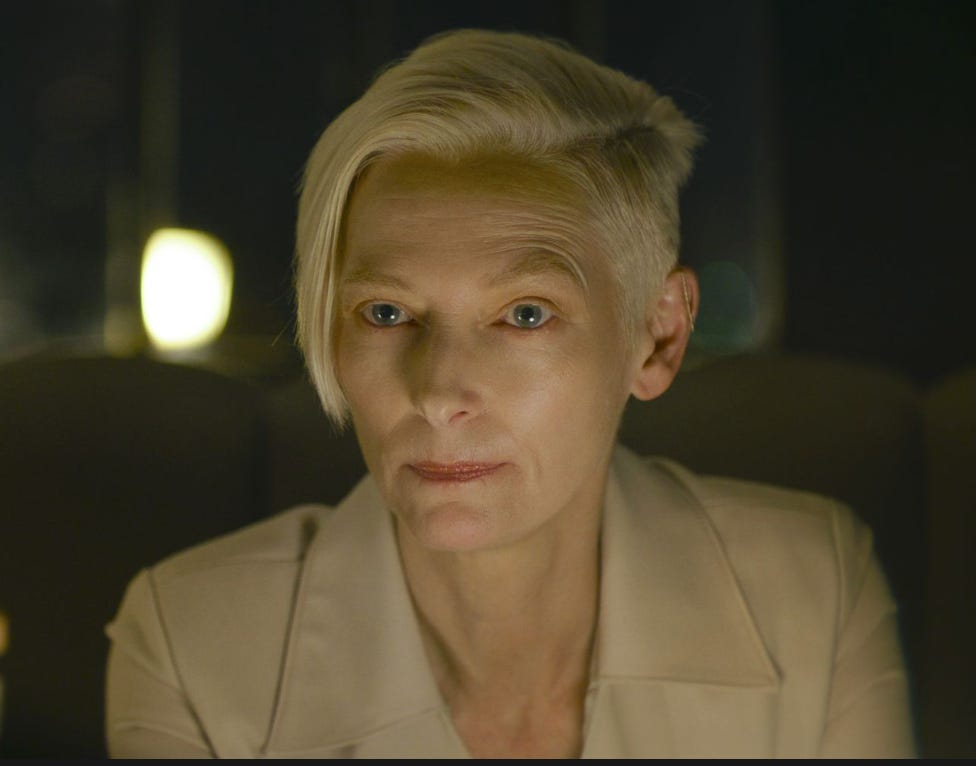"The Killer" is a Slow Cool
A stoic, methodical killer is the focal point of a 2 hour film by acclaimed Gen X director David Fincher.
The Killer is playing on Netflix
Grade: B- (Standard Fincher fare (male POV, long monologues, dissection of the anatomy of a lifestyle, fit alpha anti-hero, cool music)
Created by: David Fincher
“Heavy words are so lightly thrown / But still I'd leap in front of a flying bullet for you.” - The Smiths, What Difference does it Make?
Post-punk alt-rock 80s band The Smiths is the chosen ambiance artist of choice in The Killer, the highly-rated release by David Fincher, an auteur known for films depicting the gritty underside of modern culture and its effect on people - alienation, isolation and loneliness. Fincher, a Gen Xer whose film sensibilities are very much of his generation, is to film what Kurt Cobain was to music of that era - both catalysts for a wholly original and distinctly nihilist (read: radical skepticism) narrative.
Fincher’s most memorable work can be found in his early films depicting the darker sides of the human psyche in all its unguarded fragility (Fight Club, The Game, and Seven). Unlike Cobain, who joined the ranks of the famed 27-club of talented artists who died as a result of drug and alcohol abuse at the age of 27 like Jimi Hendrix, Amy Winehouse, Jim Morrison, and Janis Joplin, among others, and therefore only achieved a fraction of his potential, Fincher’s film career has been expansive over the years with a plethora of TV and film credits to his name.
Incidentally, one of my favorite TV shows of the last decade is Fincher’s Mindhunter (Netflix), based on the true life accounts of famed FBI agent John Douglas in the 70s and 80s who developed the science of criminal profiling and patterns of serial “sequence” killers. It’s an arresting and hypnotic show casting an against-type Broadway actor Jonathan Groff in the starring role, which pays off. It showcases Fincher’s love of neo noir and “inside the mind of criminal” themes found in Seven and Zodaic to great effect.
In his latest oeuvre, Fincher goes back to another theme - that of the talkative, unbalanced narrator who is too smart for his own good - who resorts to calculated violence to right the wrongs of the world or at least navigate it in the way that he can. As the film’s title character, Fassbender, who noticeably has been on too long of a hiatus IMO, plays the role with the prerequisite efficiency and ethos of a Fincher anti-hero (see Fight Club). However, by design you never see beneath the surface of Fassbender’s Killer. In fact, in the credits for the film, he’s “The Killer” - no name needed. He’s a lean, protein-eating, fighting machine. The kind that goes to McDonalds in France, orders a sausage egg McMuffin and removes the muffin part. This is one of the lighter moments in an otherwise grim film. Amen to Fincher’s authenticity in showing that carbs deprivation is really the only way to maintain that lean body.
The catalyst that propels the film towards its climax is that the gun-for-hire aka “The Killer” misses his mark. From there, his girlfriend (the only sign that the killer is capable of any sort of intimate relationship) takes the hit, literally being beaten within an inch of her life for his error. As a viewer, we make the giant assumption that the killer’s motives in avenging the crimes against the girlfriend are borne from his love and desire to play protector, which feels like an odd motive for a man who is void of emotion and any interests, apart from killing.
The film goes into painstaking detail on the minutiae of the killer’s lifestyle. Morrissey, lead singer of The Smiths, is the cerebral distraction that the killer frequently tunes into as he repeats self-help mantras to keep him focused on his next victim and the jobs to be done. Case in point: He’s showering in airport lounges, shaving in gas station bathrooms, throwing out guns in city trashcans, employing smartphones for single use and destroying them after saying two words, and fronting as many aliases (like Sam Malone, Robert Hartley, George Jefferson) on passports as there are days in the year. He’s also a pilates/barre king. The yoga poses of the killer alone are worth the price of sitting through the boring stake-outs with Fassbender sporting various bucket hats. I’ll be happy if I never see another Apple Watch employed to illustrate the point of the killer’s adrenaline-racing BPM state vs the exact BPM needed for the killer to properly fire the gun (~60).
The Final Cut
The Killer is clever and as a pop culture aficionado I relished the easter eggs like the alias names all being TV show icons (Cheers, Newhart, The Jeffersons) from the 70s and 80s and the homage to The Smiths (Fight Club had The Pixies). Fassbender is a dream here. I spent part of the film wondering who else could have played his character and came up with Christian Bale in his Batman Begin physique days with sinewy musculature and because I could see him demonstrating equal dedication to the method required to play aloof, orderly, and downright annoying.
Fassbender’s physique warrants its own awards’ category.
The discerning Tilda Swinton, as the “Q-Tip” assassin (hilarious!) is under utilized here and her chess game tete-a-tete with Fassbender’s The Killer in a swanky West Chester restaurant which felt like a Tarrytown locale, was a high point of the film. It was also a rare occasion where we had some dialogue, though mostly Swinton doing monologue. My main grievances with the film are the repetitive monologues delivered by the killer, the never-ending quiet non-verbal parts which account for enough of the film to notice, and the physical and mental attention required to give a damn about the lifestyle of the killer.
If the actual killer was anyone other than a very photogenic and fashionable Fassbender, would I care?
The answer is probably not.







I keep thinking about your comparison of Fincher to Kurt Cobain and need to sit with that one for a little while. I think that me not being a bit Fincher fan made me want to argue against it, but I am starting to get the overlap. I don’t see the vulnerability and humor that Cobain always showed beneath the anger and anguish in Fincher’s work. I suppose that’s where it doesn’t match up for me.
Excellent review! Are you going to write about the new season of Fargo?